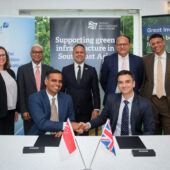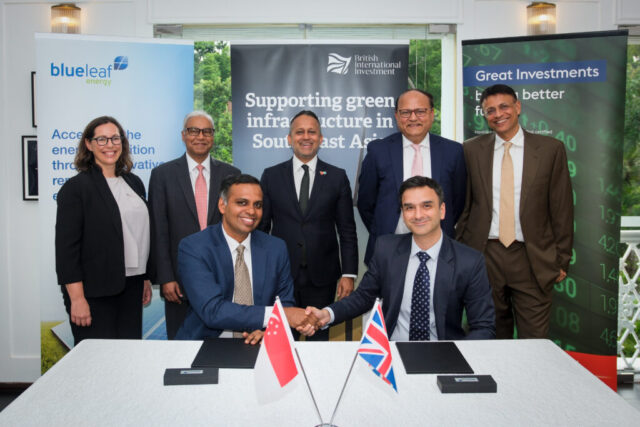Co-investment by public and private institutions such as pension funds is key to closing the global sustainable development financing gap, a UN-backed development finance conference in Seville heard.

A joint declaration on partnership opportunities between institutional investors and multilateral development banks (MDBs), announced at the Fourth International Conference on Financing for Development (FFD4) in Seville last week, is the latest attempt to encourage co-investing by public and private institutions in emerging markets and developing economies (EMDEs).
The declaration, backed by the governments of Denmark, Finland, Iceland, the Netherlands, Norway, Sweden and UK, was presented during the conference, an event attended by some 15,000 people with the aim to pave the way for reform of international financial architecture and address financing challenges holding back investment needed to meet the UN Sustainable Development Goals (SDGs).
Since its predecessor conference, held in Addis Ababa in 2015, the challenges facing development funders have worsened, with the annual gap in financing for sustainable development globally estimated by the UN to stand at $4trn (€3.4trn), compared with $2.5trn prior to the COVID pandemic. Hopes of closing the gap largely rest with a rapid scaling up in private investment targeting EMDEs, in tandem with support from MDBs and development finance institutions (DFIs).
In the declaration, the seven European governments said MDBs and DFIs were “uniquely positioned to create attractive and scalable private sector investment opportunities across EMDEs”, given their “critical and central role” in delivering on sustainable growth and support for the energy and climate transition.
They highlighted the scale of the opportunity, noting that total European pension fund assets alone exceeded €15trn and said they saw untapped opportunities in connecting MDBs, DFIs, and institutional investors.
The governments called for the scaling up of initiatives involving MDBs, DFIs and dedicated asset managers to provide investment solutions that would engage leading global institutional investors.
“We also express our strong endorsement for innovative vehicles such as funds and platforms that provide attractive, standardised, large-scale investment opportunities for pension funds and other institutional investors, thereby significantly enhancing the financial resources directed towards the goals,” the declaration said.
MDBs and pension funds
One investment vehicle mentioned in the declaration is that being developed by ILX, a Dutch-based asset manager, which provides opportunities for institutions such as European pension funds to invest in net-zero aligned projects alongside MDBs, rather than as part of complex blended structures. The mechanism leverages the extensive risk assessment capabilities and co-investing clout of MDBs to make long-term EMDE investments more attractive to pension funds and other institutions.
Speaking from the Seville conference, Manfred Schepers, ILX’s CEO, told Impact Investor that returns on co-investment by private institutions in the energy transition of high-growth emerging markets could be at least as attractive as investment in slow-growth developed economies.
“This is a journey. Pension funds make decisions cautiously – creating the space in the portfolios to be able to do this takes time. But I’m convinced that it is something they will do and that it’s going to be the game changer,” he said.
“The funding from the MDBs themselves is there, and I think the mobilisation of private capital, particularly in middle-income countries, is going to be significant,” he added.
One of the MDBs working with ILX is the European Bank for Reconstruction and Development (EBRD). Christian Kleboth, the multilateral’s head of debt mobilisation told an FFD4 session on the launch of the declaration that there was much to learn on both sides.
“We need to get used to working with pension funds. They are very different from the partners we have worked with before. So, we need to learn what they need, what are their priorities, and we need to start to structure so they can actually invest,” he said.
Ylva Lindberg, EVP strategy and communication at Norwegian DFI Norfund, said recognising the different motivations for DFIs and institutional investors was essential.
“[Institutional investors] will be looking for diversification. They will be looking for attractive risk adjusted returns. They will be looking to serve their fiduciary duty. As DFIs and MDBs, we will be looking for impact, but will also be looking for attractive returns, because otherwise we are not serving our mandate,” she told FFD4.
Kleboth and Lindberg agreed that organisations such as ILX had an important role to play in as a bridge between public and private investors.
“We also need to make sure that we don’t make things too complex, because we need to move at speed and we need to move at scale,” Lindberg said.
GEMs data
The declaration also highlighted the value of the Global Emerging Markets Risk Database (GEMs), which holds historical credit risk data shared among MDBs and DFIs, some of which is now publicly accessible to institutional investors and their advisers.
The governments said the GEMs data demonstrated that development finance investments did provide “attractive, risk-adjusted returns on EMDE credit investments, while generating measurable social and environmental impact”. The declaration called for improvements in GEMs credit data and the publication of investment return data.
Schepers said GEMs was a valuable resource in attracting private investors to EMDEs.
“Since last year, the credit risk data of the MDB system and of the development finance asset class has become a public good. Some people say the data is still not good enough, but it’s a lot better than the limited credit data that is available for the broader private credit markets in North America or Europe,” he said.
Schepers said he hoped private sector institutions would take a cue from several initiatives launched in Seville aiming to facilitate investment in EMDEs, allowing development finance spending targets to be met.“People often blame governments for the lack of progress in meeting the SDGs, but I think the private sector has an immensely important role to play and discussions in Seville have really emphasised that,” he said.





